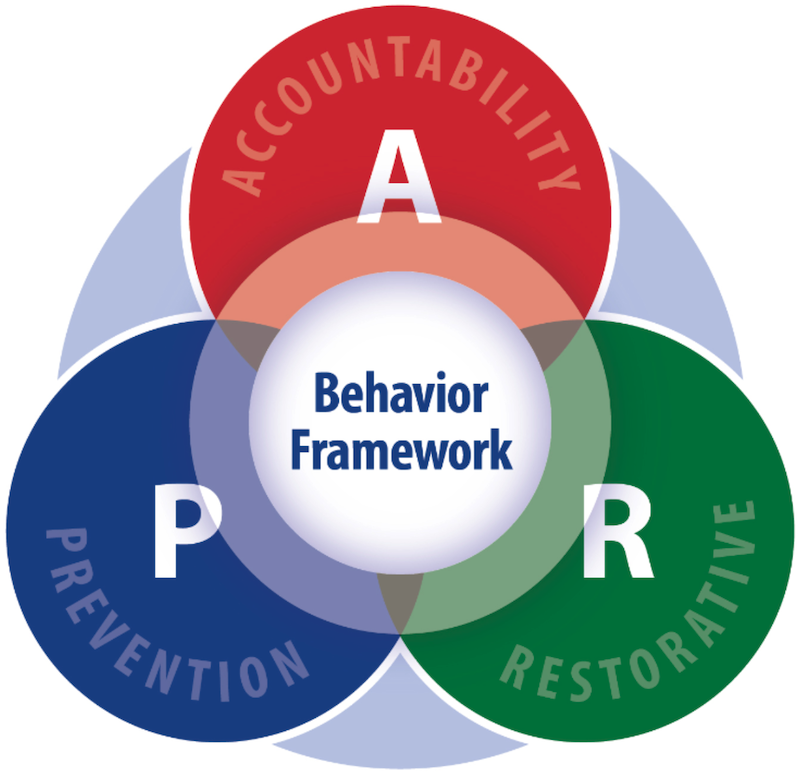PAR Behavior Framework
Introduction
The mission of Lincoln Public Schools is to prepare ALL students for successful careers, lifelong learning, and civic engagement. In order to prepare all students, Lincoln Public Schools is committed to positive behavior grounded in supports for ALL students that build strong and safe school communities. Supports for student wellbeing and positive behavior have a direct impact on instructional outcomes, school climate, and safety. Using evidence-based practices to support student behavior promotes equitable outcomes for all students.
This comprehensive PK-12 framework is designed to equip teachers, staff, administrators, and stakeholders with the tools, strategies, and practices necessary to cultivate a positive and supportive environment. Understanding and effectively managing behavior is fundamental to creating a learning environment where students can thrive academically, socially, and emotionally. This handbook aims to provide a structured framework that encompasses evidence-based practices, preventative strategies, consistent and clear accountability, and restorative approaches to address behavior in educational settings.

The Early Childhood Behavior Framework (Appendix 12) specifically addresses the approaches, responses and interventions used in Lincoln Public Schools preschool classrooms in a continuum of prevention, promotion and intervention. While it may seem to be a straightforward matter of simply applying the K-12 framework to the youngest students in LPS, the reality is preschool students have unique needs and the Early Childhood Behavior Framework is comprised of evidence-based practices for young children which include effective instruction, strategies to promote engagement and appropriate behavior, promotion of young children’s social skills and emotional competencies, as well as the implementation of assessment-based behavior support plans for young children with the most severe behavior challenges. The Early Childhood Behavior Framework is implemented in all LPS preschool classrooms as it addresses the specific, unique, and developmental needs and levels of our youngest students.
Additionally, the Nebraska Student Discipline Act (Revised by LB 705, 2023) was a foundational piece during the development of the framework: “The Student Discipline Act’s purpose is to assure protection of all elementary and secondary school students’ constitutional rights to due process and fundamental fairness within the context of an orderly and effective educational process.”

Purpose of the Framework
The primary purpose of this handbook is to:
- Give an introduction to the foundational principles of behavior.
- Emphasize the importance of relationships, community, and a positive, supportive environment.
- Provide a structured and restorative approach to the prevention of and response to unwanted behavior.
- Offer guidelines on fostering positive behavior and preventing unwanted behavior.
- Equip educators with evidence-based strategies for prevention, intervention, response, and support.
- Provide a matrix for accountability to increase consistency for students, staff, administrators, and other stakeholders.
- Provide resources and practical tools to support implementation.
Access the Framework
How to Use this Handbook
This handbook is intended to be a comprehensive resource that can be used as a guide, reference, and training tool to improve support for all students, teachers, staff, administrators, and stakeholders in Lincoln Public Schools. It is designed to be applicable in various educational contexts and can be tailored to suit the specific needs of schools and their communities. Regular updates to the framework based on collaborator feedback will be made to stay current with evidence and best practices, as well as the needs of Lincoln Public Schools. The framework is not meant to replace or supersede any existing LPS policies or state and federal laws.
This framework aims to empower educators and stakeholders to create nurturing and supportive environments that promote positive behavior and enhance the overall educational experience for all. Above all, the framework is intended to address daily, routine student discipline issues that arise frequently throughout LPS. The practices referenced within are not meant to address emergency or crisis situations.
This framework will be reviewed as needed with new and existing staff. The framework will be reviewed jointly by the LEA and LPS when mutually deemed necessary.
PAR Behavior Framework Website (LPS Staff Login Required)

